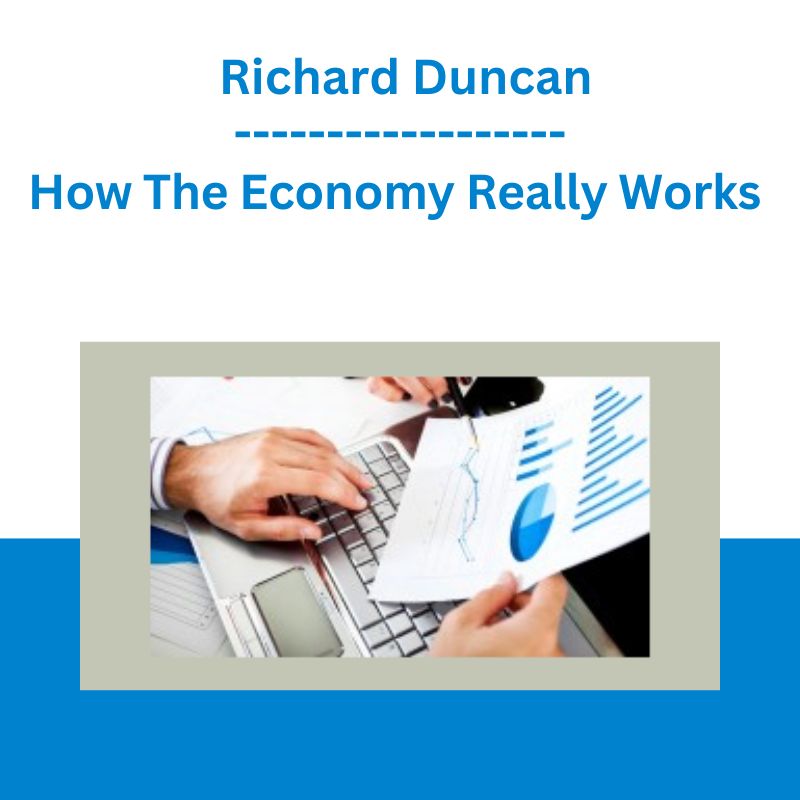*** Proof of Product ***

Exploring the Essential Features of “How The Economy Really Works – Richard Duncan”
What you’ll learn
By the end of the course, you will understand how the economy works in the 21st Century. You will see how and why the government directs the economy; and you will be better
Requirements
There are no prerequisites for this course.
Description
Up until roughly 100 years ago, the government played very little role in the economy. It was generally believed that the economy worked best when directed by the autonomous forces of supply and demand. During the 18th and 19th Centuries, a consensus emerged on how the Capitalist economy worked; and that classical economic theory has been the foundation of economic teaching ever since.
The economy no longer works the way it did during the 19th Century, however. Over the past 100 years the government’s involvement in the economy has expanded so radically that the economic system itself has little left in common with Capitalism – at least, not at the Macro level. Yet Economics continues to be taught as if nothing has changed; and, for the most part, the public continues to believe that our economy is still driven by natural forces as it always was in the past. But that is very far from the truth.
Today, the government manages – or directs – the economy using a variety of policy tools to ensure that Gross Domestic Product continues to expand. The implications of this fact are very far reaching. It is impossible to understand politics or economics in our era without grasping that the government is managing the economy. Moreover, it is particularly important that investors understand this new reality because government actions now impact the direction of asset prices far more than any other variable.
This Course explains how the economy really works.
Who this course is for:
Investors, students of economics, politics & history, the business community, journalists, policy makers, and the general public.
Course content
Introduction
- What’s Changed
The Economy Is Managed By The Government
- Don’t Call It Capitalism
- Who’s In Charge?
Mesuring The Economy
- GDP 101
Fiscal Policy
- Budget Deficits
- Where Does The Government Get And Spend The Money?
MONEY
- Interest Rates, Inflation and Globalization
- Monetary Policy and Net Worth
Trade
- Trade Deficits and Their Impact On Asset Prices
CREDIT
- Credit Growth Drives Economic Growth
Conclusion
- Summing Up A Decade Of Work
Instructor
Richard Duncan
Author, Economist, Consultant, Lecturer
Richard Duncan is the author of three books on the global economic crisis. The Dollar Crisis: Causes, Consequences, Cures (2003) explained why a worldwide economic calamity was inevitable given the flaws in the post-Bretton Woods international monetary system. It was an international bestseller. The Corruption of Capitalism (2009) described the long series of US policy mistakes responsible for the crisis. It also outlined the policies necessary to permanently resolve it. His latest book, published in 2012, focuses specifically on the role that credit creation has played in this disaster. It’s entitled The New Depression: The Breakdown Of The Paper Money Economy.
Since beginning his career as an equities analyst in Hong Kong in 1986, Richard has served as global head of investment strategy at ABN AMRO Asset Management in London, worked as a financial sector specialist for the World Bank in Washington D.C., and headed equity research departments for James Capel Securities and Salomon Brothers in Bangkok. He also worked as a consultant for the IMF in Thailand during the Asia Crisis. He is now chief economist at Blackhorse Asset Management in Singapore.
Richard has appeared frequently on CNBC, CNN, BBC and Bloomberg Television, as well as on BBC World Service Radio. He has published articles in The Financial Times, The Far East Economic Review, FinanceAsia and CFO Asia. He is also a well-known speaker whose audiences have included The World Economic Forum’s East Asia Economic Summit in Singapore, EuroFinance Conferences in Miami and Copenhagen, The Chief Financial Officers’ Roundtable in Shanghai, and the World Knowledge Forum in Seoul.
Richard studied literature an economics at Vanderbilt University (1983) and international finance at Babson College (1986); and, between the two, spent a year traveling around the world as a backpacker.
Please see the full list of alternative group-buy courses available here: https://lunacourse.com/shop/










 Trade Like Mike - The TLM Playbook 2022
Trade Like Mike - The TLM Playbook 2022